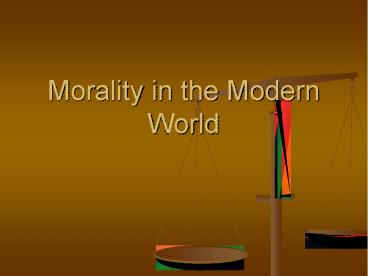Morality in the Modern World - PowerPoint PPT Presentation
Title: Morality in the Modern World
1
Morality in the Modern World
2
Where does morality come from?
3
Euthyphro Dilemma
4
(No Transcript)
5
Euthyphro Dilemma
- The Euthyphro argument gets its name from Platos
Euthyphro dialogue a dialogue between Euthyphro
who is prosecuting his father for killing his own
slave and Socrates, who is being prosecuted for
corrupting the youth. - In general, the Euthyphro Dilemma consists of
asking whether the Good exists because God wills
it, or whether God acts in conformity to the idea
of the Good. - In short, it consists of asking where do moral
standards come from ?.
6
- The Euthyphro dilemma is introduced with the
question from Socrates to Euthyphro - Does God command the good because it is good,
- OR
- or is it good because it is commanded by God?
7
(No Transcript)
8
First Horn of the Dilemma
- Asserts that God commands the good because it is
good in itself. - If God commands the good because it is good, then
he bases his decision what to command on what is
already morally good. - Moral goodness, then, must exist before God
issues any commands, otherwise he wouldnt
command anything. - If moral goodness exists before God issues any
commands, though, then moral goodness is
independent of Gods commands - Gods commands arent the source of morality,
but merely a source of information about
morality. - Morality itself is not based in divine commands.
9
Second Horn of Dilemma
- Asserts that the good is good because it is
commanded by God. - On this view, nothing is good until God commands
it. - This, though, raises a problem too
- if nothing is good until God commands it, then
what God commands is completely morally
arbitrary - God has no moral reason for commanding as he
does morally speaking, he could just as well
have commanded anything else. - This problem is exacerbated when we consider that
God, being omnipotent (all-powerful), could have
commanded anything at all.
10
- He could, for example, have commanded polygamy,
slavery, and the killing of the over-50s. - If divine command theory is true, then had he
done so then these things would be morally good. - That doesnt seem right, though even if God had
commanded these things they would still be
morally bad. - Divine command theory, then, must be false.
11
Divine Command Theory
- D.C.T.
- 2nd Horn
12
Doing Gods will
- Divine command theory holds that morality is all
about doing Gods will. - God, divine command theorists hold, has issued
certain commands to his creatures. - We can find these commands in the Bible or other
holy books, or by asking religious authorities,
or perhaps even just by consulting our moral
intuition. - We ought to obey these commands thats all
there is to ethics.
13
Divine Command Theorists
- There are several reasons for theists to be
divine command theorists. - If God is the creator literally all things, then
he created morality. - If God rules over all Creation, then we ought to
do what he tells us to do. - The consistent message of the Bible is that we
should obey Gods commands.
14
Argument against DCT
- The most famous argument against divine command
theory is the Euthyphro Dilemma. - However the divine command theorist tries to
answer the questions from the two horns of
dilemma, unacceptable consequences seem to arise
15
Absolute Morals
- Is the belief that there are moral principles
which hold true for all people at all times in
all situations. - In religion moral absolutism is often found
under the guise of DCT. - It means that God has set down a set of moral
values which hold true for all people at all
times in all circumstances. - This means that the moral values cannot be
changed or added to, they are objective.
16
Relative Morals
- Is the view that there are no objective, absolute
ethical truths. - Moral facts only hold relative to a given
individual or society. - According to this ethical theory, what is morally
good for one person or culture might be morally
bad for another, and vice versa there are no
moral absolutes. - The individualistic form of moral relativism,
according to which morality varies between
individuals, is subjective ethics.
17
Heteronomous Morals
18
- Root meaning of heteronomous comes from rules
followed by others - Follow moral rules given by others out of
obedience to an authority who has coercive power - Heteronomous morality is conformity to external
rules that are simply accepted and followed
without question. - Examples of heteronomous morality derived from
power and authority or other sources of guidance
are parents, teachers, community, religion etc.
19
- Morality is considered heteronomous if it depends
on religious beliefs or if it has been developed
with reference to a set of values provided by
religion. - Society influenced by religious views and
attitudes. These have an unconscious effect, even
on those who are not religious. - Contrasts with autonomy-Autonomous moral systems
which depend on reasonableness and good-will of
individuals - but this cannot be guaranteed. - Ultimate authority for Christian morality (as for
Muslim, Jewish, Sikh and Hindu) is God's will.
20
Autonomous Morals
- Root meaning of autonomous comes from- follows
moral rules of self - Such rules are self constructed and self-
regulating principles. - It means that moral values are independent of
religious belief. - Highlights reason as the main source of morality
21
- Does not rely on guidance from any other source.
- Contrasts with heteronomy.
- Describes reasons for the rejection of religion
as source of morality. - Explains that both religious and non-religious
people can accept that moral values are
autonomous e.g. you make an autonomous choice
whether to follow the heteronomous morals of a
religion.































